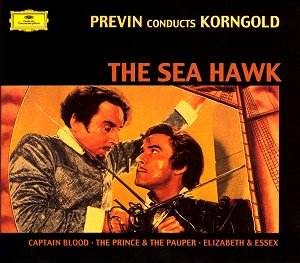It was once said that if Mozart were alive today he
would be writing film music. Whether they would have sounded like Korngold’s
sweeping scores for these Errol Flynn ‘swashbucklers’ (or ‘schwanzbuchlers’
as Korngold called them) is an imponderable question. What is certain
is that if Max Steiner was the natural heir to Wagner (the Ring, after
all, is the beginning of modern film music) then Korngold was the first
truly great composer to write for films in the talking era. His influence
continues to this day, notably in the film scores of John Williams.
Korngold’s film music, unlike Williams’, closely resembled
in style his own classical compositions. The love theme from Elizabeth
and Essex, for example, could so easily have been lifted from the
pages of Korngold’s own violin concerto – it has a similar aching beauty
- and the great brass fanfares of The Sea Hawk are reminiscent
of Korngold’s Symphony. And there is nothing more moving on this disc
than the ‘Sold into Slavery’ excerpt from Captain Blood, pure
and quintessential Romanticism. Wagner’s own use of the leitmotif, so
crucial to the musical development of the Ring, is brazenly taken up
by Korngold in all of his scores placing Korngold firmly in the Wagnerian
tradition which Steiner mastered so wonderfully in his score for the
Errol Flynn film The Charge of the Light Brigade.
Korngold’s greatness as a film composer, however, lies
in his ability to sustain drama, and few composers before or since were
as successful in creating the tension of the on screen play-off as Korngold
was. The duel scene in The Sea Hawk is as vivid as those he composed
in 1938 for The Adventures of Robin Hood (unfortunately not included
on this disc), the panache of the writing simply irresistible. There
can be no greater compliment to Korngold’s music than the fact that
every one of these scores rekindles memories of the films themselves.
It is imagistic in a way most modern film music simply isn’t. Or maybe,
they just don’t make films like they used to.
The playing of the London Symphony Orchestra, one of
the greatest of all film orchestras, is superlative with rich string
tone and golden brass. Previn’s conducting is exciting generating considerable
tension throughout, as one might expect from him, aided by a full and
powerful recording by DG. This is, in short, a superb disc in every
way.
Marc Bridle
But Ian Lace is not quite so sure:-
How times change. When Charles Gerhardt’s similarly
entitled pioneering album ‘The Sea Hawk’, the first in the RCA series,
‘Classic Film Scores’, released through the 1970s, it was barely mentioned
in Gramophone except in the film music section that was routinely
relegated to the back pages. In those days, Korngold was sniffily regarded
as "more corn than gold". Now not only has Korngold become
respectable and has made it to front page status of Gramophone
(March 2002 edition) but this new recording of the ‘Tudor/Elizabethan’
film music by Korngold recorded by André Previn has actually
been awarded the accolade of Recording of the Month. (I have to ask
myself whether the Gramophone reviewer, Adrian Edwards, has ever
heard the Gerhardt recording?)
I have to say straight out that this new recording
disappoints. Patrick Russ has arranged the suites so that too many slow
sections are strung together in Elizabeth and Essex for instance,
and Previn’s slow tempi in the slower sections of The Sea Hawk
do not help either. Consequently the vitality of Korngold’s exuberant
scores tends to be drained. This recording cannot displace the Gerhardt
recording that still sounds stunning today, recorded by the National
Philharmonic Orchestra, a crack recording ensemble assembled from the
cream of the London orchestras, under concert master Sidney Sax, and
recorded in the Kingsway Hall and engineered by Kenneth Wilkinson. You
might find difficulty in tracking down these albums (they were later
reissued in CD format) but they really are worth tracking down. RCA
should be persuaded to re-release them in the latest technology sound!
But to return to the new Previn disc. The sound quality
is very good and there is much to enjoy and there is some music that
was not included in the RCA series (although Korngold fans can catch
up on these by buying dedicated score albums from Varèse Sarabande
etc).
Incidentally it was good to see in the booklet notes
due reference given to Korngold’s hard-working orchestrators at Warners:
including Ray Heindorf and, particularly, Hugo Friedhofer.
Ian Lace


